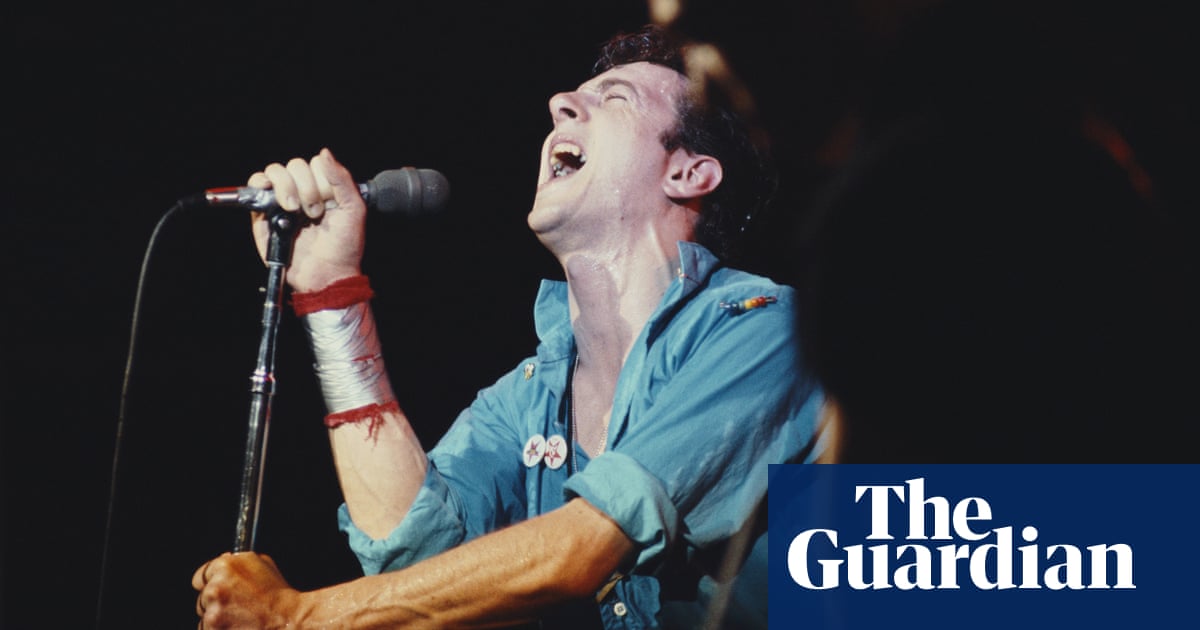The Clash’s 40 greatest songs ranked!
Forty years on from the London Calling album, we rate the best tracks by the genre-hopping punks
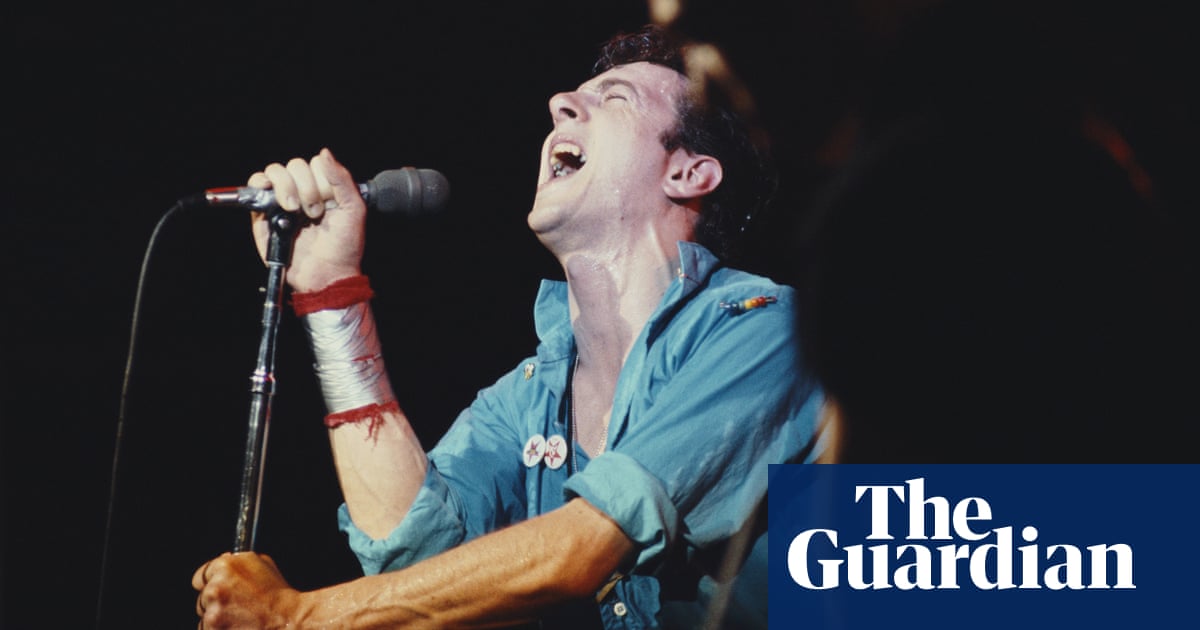
40. 1977 (1977)
A historical artefact, not for the proto-punk music, but because the lyrics epitomise the new waves perceived threat to the old guard. No Elvis, Beatles or the Rolling Stones / In 1977, sang Joe Strummer, hardly about to let his love of such pop greats get in the way of punks declaration of year zero.
39. White Riot (1977)
Guitarist Mick Jones now dislikes the first Clash single, its lyrics written by Strummer after the band were caught up in the 1976 Notting Hill riots and he concluded white people needed a riot of our own. The sentiment hasnt aged well, but the song exemplifies the amphetamine-fuelled punk the band would leave behind.
38. Whats My Name (1977)
A Clash curio in that its the only one of the groups songs to bear a writing credit for Keith Levene, the bands original guitarist. Levene showers melodic gold dust all over this otherwise shouty punk stomper, but is better known for his work with John Lydon in Public Image Ltd.
37. Know Your Rights (1982)
From Combat Rock, the final album by the classic quartet of Strummer, Jones, bassist Paul Simonon and drummer Topper Headon. The tank was getting emptied, but Strummers black humour brims through lines such as You have the right to free speech / As long as youre not dumb enough to actually try it.
36. Im So Bored With the USA (1977)
This hugely anthemic track on debut album The Clash began life as Im So Bored With You, a song about Joness girlfriend, before Strummers ad-libbed SA took it in a new direction. The blistering critique of US imperialism and exported culture (Yankee detectives are always on the TV) didnt stop the Clashs love of American iconography, cars and clothes.
35. Janie Jones (1977)
Original Clash drummer Terry Chimes uncharitably credited as Tory Crimes on The Clash propels the debuts storming opener, a eulogy to a 60s pop celebrity and libertine who had been jailed for vice offences in 1973. On release, the convicted madam returned Strummers affections in the song Letter to Joe.
34. Charlie Dont Surf (1980)
By the epic three-disc fourth album, Sandinista!, the Clash arguably had too many ideas for their own good, but within the 36-song sprawl are undoubted treasures. Titled after a Lt Col Kilgore quip in Apocalypse Now, theres an element of the doo-wop era to this sweet song about, well, cultural imperialism.
33. Brand New Cadillac (1979)
This bracing cover of a 1959 Vince Taylor and the Playboys track refers to the early Brit rockers glamorous dream car (when most of them probably had to make do with a humble Ford Anglia). From the double album London Calling, the Clashs creative zenith.
32. The Guns of Brixton (1979)
Brixton boy Simonon wanted some songwriting cash and so penned this memorable song about police harassment and discontent in his London neighbourhood, two years before the district exploded into rioting. In 1990, Simonon received an unexpected windfall when Norman Cook (later Fatboy Slim) sampled the groove for Beats Internationals hit Dub Be Good to Me.
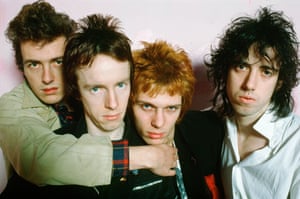
31. Clash City Rockers (1978)
Year zero meant many punks hurriedly buried their pasts in pub rock bands with long hair, but this 1978 single reworks a song from Strummers old pub rock band, the 101ers, around trademark Clash self-mythology. The shift from aggressive guitars (surely copied from the Whos I Cant Explain) to something more mournful suggest musical adventure to come.
30. Rudie Cant Fail (1979)
According to long-time Clash associate Don Letts, this London Calling gem is the fruit of a long hot summer that the Clash spent smoking herb and going to reggae clubs. Its a horns-drenched homage to Caribbean culture, drinking brew for breakfast and the chicken skin suit.
29. Tommy Gun (1978)
A great single from the not universally adored second album, Give Em Enough Rope. Strummer is scathing about the idea that terrorists see their cause as glamorous, yelling: Youll be dead when your war is won, while Headons snare drum rolls resemble gunfire. This didnt stop the singer posing for photos in a T-shirt honouring Italian-based violent leftist organisation Brigate Rosse (the Red Brigades).
28. Police and Thieves (1977)
This cover of the Lee Scratch Perry-produced Junior Murvin hit stands out a mile on The Clash. Its their first attempt at reggae, played punkier, with a new, Jones-penned intro. That summer, Bob Marley (working with Perry) acknowledged the burgeoning punk/Jamaican music love-in with Punky Reggae Party.
27. Londons Burning (1977)
Also from the debut album, this most captures those punk rock summers of 1976 and 1977, with its bone-crunching verse and rabble-rousing chorus. The imagery is a comprehensive list of the band and movements inspirations, from high-rise living above the Westway (where Jones lived with his gran) to a capital city burning with boredom now.
26. Somebody Got Murdered (1980)
According to Pat Gilberts superb book Passion Is a Fashion, the Clash were approached by producer-arranger Jack Nitzsche to provide a song for the William Friedkin movie Cruising, but he never called again. Thus, the song lit up Sandinista! with its effervescent tune and film noir-ish imagery about a random killing.
25. Career Opportunities (1977)
The limited youth employment of the 70s is timelessly skewered (Career opportunities, the ones that never knock) in this gem from the debut. The line I wont open letter bombs for you refers to an actual job once held by Jones, checking government mail for explosive devices.
24. Pressure Drop (1979)
The B-side of the slightly hackneyed English Civil War and one of the Clashs great covers, of Toots and the Maytals 1970 reggae/ska classic (as heard in the 1972 film The Harder They Come). Later, Strummer was at pains to point out that they recorded it in 1977, hence it pre-dates 2-Tone.
23. This Is England (1985)
Headon and Jones had been sacked by now (for heroin abuse and behavioural issues, respectively) as a remodelled, five-piece Clash made a sixth album. The otherwise unloved Cut the Crap did herald this final terrific single. Keyboards and guitars drive Strummers withering take on our national strife.
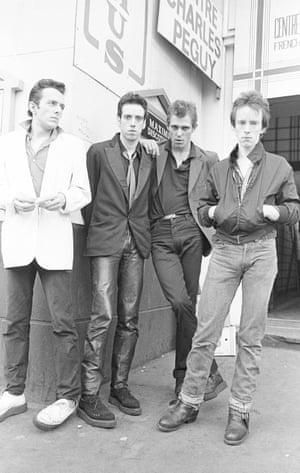
22. Gates of the West (1979)
The Clash had been singing about the US since Im So Bored With the USA. Based on Rusted Chrome, an early Jones composition, this stormer from the Cost of Living EP describes their New York experiences, the characters, imagery and anthemic tune all reminiscent of Bruce Springsteen.
21. Hitsville UK (1980)
From Sandinista!, this eulogy to pop is a bubblegum delight that namechecks the UKs emerging independent labels and argues that a great two minutes 59 single can triumph over industry sharp practice. With its Motown (the original Hitsville) groove and sugar-coated duet between Jones and his girlfriend, Ellen Foley, the Clashs remaining hardcore punk fans hated it.
20. Police on My Back (1980)
Another terrific example of the Clashs ability to cover a song (the original was by Eddy Grants old band, the Equals) and make it sound as if they had written it. Joness guitar wails like a siren, and the song has all the adrenalin rush of a police chase.
19. Lost in the Supermarket (1979)
In the tradition of the Rolling Stones (I Cant Get No) Satisfaction and the X-Ray Spex back catalogue, this is a great Strummer-penned/Jones-sung song about the dehumanising effects of advertising and the consumer society. (I came in here for that special offer / A guaranteed personality.)
18. I Fought the Law (1979)
The band reputedly heard the Bobby Fuller Four original on the studio jukebox in San Francisco while recording Give Em Enough Rope. Writing credits aside, this is a trademark Clash smash, full of outlaw rebel posturing and laden with Headons six-shooter drum cracks.
17. Death or Glory (1979)
Strummers ferocious blast at ageing, sellout rock stars builds to a hurtling climax on a lyrical twist as he fears a similar fate himself. Presumably it was ruled out as a single because of the infamous, hilarious line: But I believe in this and its been tested by research / He who fucks nuns will later join the church.
16. Safe European Home (1978)
Strutting around Kingston, Jamaica, in full punk regalia (in theory to stir the creative juices for Give Em Enough Rope) proved a rude awakening, but did produce this untypical example of Clash self-mockery. I went to the place where every white face / Is an invitation to robbery / And sitting here in my safe European home / Dont want to go back there again.
15. Clampdown (1979)
Strummers view that capitalism was endangering people and the planet was sharpened by the Three Mile Island nuclear accident, which inspired this London Calling highlight. The Clash were exploding with musical ideas by now, and packed rock, funk and disco into this fiery, timeless anthem.
14. Garageland (1977)
The rock critic Charles Shaar Murrays dismissal of the Clash as a garage band in an early live review prompted this defiant riposte, which also reflects the bands fretting that signing to a major label would be selling out. Its a furious but somehow melancholy anthem: People ringing up making offers for my life / But I just wanna stay in the garage all night.
13. The Card Cheat (1979)
Surely channeling Joness love of Mott the Hoople, this is the sort of thing that presumably inspired the Libertines. Horns, drum rudiments, a sublime piano hook and vivid imagery (To the opium dens and the bar room gin … The gamblers face cracks into a grin) combine in a song about a card sharp who is shot for cheating.
12. Spanish Bombs (1979)
A favourite of the late INXS singer, Michael Hutchence. The melody is glorious and Strummers lyrics contrast the freedom fighters of the Spanish civil war with modern tourists. The singer partly sings it in what he called Clash Spanish. Ol!
11. Rock the Casbah (1982)
Headon wrote and played most of the music on Combat Rocks club/chart smash, which innovatively combines rock, funk and a slightly eastern feel. Strummers lyrics are inspired by Irans post-Islamic revolution ban on pop music, the singers idea being that the people would rise up and rock the casbah.
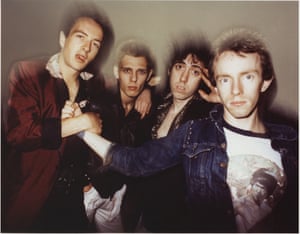
10. Train in Vain (1979)
After a planned NME flexidisc fell through, this sublime Jones unrequited love song was added to London Calling too late for listing on the initial sleeves. Pete Townshends favourite Clash tune, this is the band at their unashamedly poppiest. Headons killer drum intro fires one of the rhythm sections funkiest grooves.
9. Stay Free (1978)
Joness sublime, heartfelt eulogy to his old Strand school friend Robin Crocker, who became known as Robin Banks after a sting of heists landed him a stretch inside. Some fans were delighted to discover that Banks subsequently punched the songs producer, Sandy Pearlman, who had previously worked with Blue yster Cult and is largely blamed for Give Em Enough Ropes not exactly punky gloss.
8. The Magnificent Seven (1980)
Having rattled through punk, reggae, ska, dub and rockabilly inside five years, our boys assimilate the emerging hip-hop sounds they heard while in New York, and Strummer turns white rap pioneer. A terrific groove forms the platform for daft-but-inspired wordplay: Italian mobster shoots a lobster.
7. The Call Up (1980)
Following the Russian invasion of Afghanistan, as the US geared up to reintroduce the draft, the Clash spearheaded the resistance with this fantastic Sandinista! single. Its up to you not to heed the call up / I dont wanna die … I dont wanna kill, cries Strummer, over a magnificently eerie reggae-ish backdrop.
6. Bankrobber (1980)
So many great songs poured out of the Clash that this Mikey Dread-produced gem was almost thrown away as an import-only 45, which didnt stop it making it No 12 in the UK charts. Its dub music with folk storytelling Strummers daddy wasnt really a bank robber, but a diplomat.
5. London Calling (1979)
The Clashs highest-charting UK single, until Combat Rocks rather banal Should I Stay Or Should I Go reached No 1 in 1991 after being used in a Levis ad. Years before the climate crisis and flooding sparked public concern, Strummer fears an imminent biblical apocalypse, hence London is drowning and I live by the river.
4. Armagideon Time (1979)
The flip of the London Calling single, this superb reworking of Willie Williams social justice anthem is the definitive example of the Clash playing reggae. Strummers OK, OK, dont push us when were hot is his shouted rebuff to then-manager Kosmo Vinyl, urging him to scrap the allotted three-minute length and keep the tapes rolling.
3. Complete Control (1977)
After CBS infuriated the Clash by releasing Remote Control as a single against their wishes, the band responded with their punk-era high watermark. Lee Perry produces, and Strummers yelled Youre my guitar hero! during Joness blistering guitar solo is one of many goosebump moments.
2. Straight to Hell (1982)
Headons bossa nova rhythm and a haunting hook (later sampled by MIA for 2007s Paper Planes) power Combat Rocks finest. The bands unity was already fracturing, but Strummer rightly called this vengeful tirade against imperialism and American soldiers in Vietnam who left local women pregnant (Go straight to hell, boys) one of our absolute masterpieces.
1. (White Man in) Hammersmith Palais (1978)
Any of the Clashs best songs could grace the top spot without too much argument, but this edges it. The collision of reggae (verse) and rock (chorus) epitomise what the critic Lester Bangs described as the Clashs fusion of black music and white noise. Lyrically, a disappointingly lightweight reggae gig (in the Hammersmith Palais) triggers Strummers blistering state of the nation address, in which he considers everything from music (Turning rebellion into money) to racism and rising nationalism (If Adolf Hitler flew in today, theyd send a limousine anyway). Forty-two years on, it remains a tour de force and as relevant as ever.
Various 40th anniversary super deluxe editions of London Calling are out now on Sony.
Read more: https://www.theguardian.com/music/2020/jan/09/the-clash-40-greatest-songs-ranked
